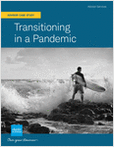What You Need to Know
- Eighty-six percent of North American family offices report that their wealth increased over 2020 and 2021.
- Health care is by far the most popular area for investment. Cannabis and crypto are promising.
- North American families prioritized cybersecurity over succession planning.
Eighty-six percent of North American family offices report that their wealth increased over 2020 and 2021, well ahead of the global average of 79%, according to a recent study from Campden Research. These family offices’ assets under management grew by 58%, just three percentage points below the global average.
They were also more likely then family offices elsewhere to say they were investing in cannabis or cryptocurrency, or would consider doing so.
The research covered 385 family offices worldwide and 179 in North America.
Twenty-four percent of families said they have taken advantage of the legalization of cannabis around North America to invest in the sector, compared with the global average of just 18%. Forty-one percent of respondents said cannabis could be a promising investment that family offices should consider, versus 33% of global peers who agreed.
Similarly, North American family offices had the edge on global contemporaries in their investments in cryptocurrency: 31% versus 28%. With an average 40% return in 2020, crypto is a promising investment, many North American families agreed.
In 2020, North American family office portfolios enjoyed robust equity returns, averaging 19% for developed markets and 16% for developing markets. This year, equities accounted for 34% of the average portfolio — 29% for developed and 5% for emerging markets.
Three in 10 family offices said they planned to increase their allocations to developing market equities in 2022.
Campden Research noted that in 2021, 45% of North American families said they favored a growth-oriented investment strategy, up from only 31% who opted for that approach in 2019.
The result: the average family office portfolio achieved 15% returns, two points ahead of the global average.











 Copyright © 2024 ALM Global, LLC. All Rights Reserved.
Copyright © 2024 ALM Global, LLC. All Rights Reserved.